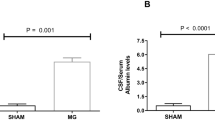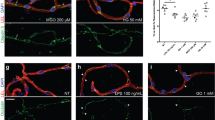Abstract
Purpose
Evidence shows that alcohol intake causes oxidative neuronal injury and neurocognitive deficits that are distinct from the classical Wernicke-Korsakoff neuropathy. Our previous findings indicated that alcohol-elicited blood-brain barrier (BBB) damage leads to neuroinflammation and neuronal loss. The dynamic function of the BBB requires a constant supply and utilization of glucose. Here we examined whether interference of glucose uptake and transport at the endothelium by alcohol leads to BBB dysfunction and neuronal degeneration.
Material and methods
We tested the hypothesis in cell culture of human brain endothelial cells, neurons and alcohol intake in animal by immunofluorescence, Western blotting and glucose uptake assay methods.
Results
We found that decrease in glucose uptake correlates the reduction of glucose transporter protein 1 (GLUT1) in cell culture after 50 mM ethanol exposure. Decrease in GLUT1 protein levels was regulated at the translation process. In animal, chronic alcohol intake suppresses the transport of glucose into the frontal and occipital regions of the brain. This finding is validated by a marked decrease in GLUT1 protein expression in brain microvessel (the BBB). In parallel, alcohol intake impairs the BBB tight junction proteins occludin, zonula occludens-1, and claudin-5 in the brain microvessel. Permeability of sodium fluorescein and Evans Blue confirms the leakiness of the BBB. Further, depletion of trans-endothelial electrical resistance of the cell monolayer supports the disruption of BBB integrity. Administration of acetyl-l-carnitine (a neuroprotective agent) significantly prevents the adverse effects of alcohol on glucose uptake, BBB damage and neuronal degeneration.
Conclusion
These findings suggest that alcohol-elicited inhibition of glucose transport at the blood-brain interface leads to BBB malfunction and neurological complications.








Similar content being viewed by others
Abbreviations
- ALC:
-
Acetyl-l-carnitine
- act-D:
-
Actinomycin D
- BBB:
-
Blood–brain barrier
- CB:
-
Cytochalasin B
- ChAT:
-
Choline acetyltransferase
- Chx:
-
Cycloheximide
- DMSO:
-
Dimethyl sulfoxide
- EB:
-
Evans Blue
- EtOH:
-
Ethanol
- GFAP:
-
Glial fibrillar acidic protein
- GLUT:
-
Glucose transporter protein
- hBECs:
-
Human brain endothelial cells
- MTT:
-
3-(4,5-Dimethylthiazol-2-yl)-2,5-diphenyl-tetrazolium bromide
- NaFl:
-
Sodium fluorescein
- NF:
-
Neurofilament
- TEER:
-
Trans-endothelial electrical resistance
- TH:
-
Tyrosine hydroxylase
- vWF:
-
von Willebrand factor
- ZO-1:
-
Zonula occludens-1
References
Bailey SM, Pietsch EC, Cunningham CC (1999) Ethanol stimulates the production of reactive oxygen species at mitochondrial complexes I and III. Free Radic Biol Med 27:891–900
Boado RJ (1998) Brain-derived peptides increase blood–brain barrier GLUT1 glucose transporter gene expression via mRNA stabilization. Neurosci Lett 255:147–150
Cahill A, Cunningham CC, Adachi M, Ishii H, Bailey SM, Fromenty B, Davies A (2002) Effects of alcohol and oxidative stress on liver pathology: the role of the mitochondrion. Alcohol Clin Exp Res 26:907–915
Hagen TM, Ingersoll RT, Wehr CM, Lykkesfeldt J, Vinarsky V, Bartholomew JC, Song MH, Ames BN (1998) Acetyl-L-carnitine fed to old rats partially restores mitochondrial function and ambulatory activity. Proc Natl Acad Sci USA 95:9562–9566
Hagen TM, Liu J, Lykkesfeldt J, Wehr CM, Ingersoll RT, Vinarsky V, Bartholomew JC, Ames BN (2002) Feeding acetyl-L-carnitine and lipoic acid to old rats significantly improves metabolic function while decreasing oxidative stress. Proc Natl Acad Sci USA 99:1870–1875
Handa RK, DeJoseph MR, Singh LD, Hawkins RA, Singh SP (2000) Glucose transporters and glucose utilization in rat brain after acute ethanol administration. Metab Brain Dis 15:211–222
Haorah J, MacDonald RG, Stoner JA, Donohue TM Jr (2003) Ethanol consumption decreases the synthesis of the mannose 6-phosphate/insulin-like growth factor II receptor but does not decrease its messenger RNA. Biochem Pharmacol 65:637–648
Haorah J, Heilman D, Knipe B, Chrastil J, Leibhart J, Ghorpade A, Miller DW, Persidsky Y (2005a) Ethanol-induced activation of myosin light chain kinase leads to dysfunction of tight junctions and blood–brain barrier compromise. Alcohol Clin Exp Res 29:999–1009
Haorah J, Knipe B, Leibhart J, Ghorpade A, Persidsky Y (2005b) Alcohol-induced oxidative stress in brain endothelial cells causes blood–brain barrier dysfunction. J Leukoc Biol 78:1223–1232
Haorah J, Knipe B, Gorantla S, Zheng J, Persidsky Y (2007a) Alcohol-induced blood–brain barrier dysfunction is mediated via inositol 1, 4, 5-triphosphate receptor (IP3R)-gated intracellular calcium release. J Neurochem 100:324–336
Haorah J, Ramirez SH, Schall K, Smith D, Pandya R, Persidsky Y (2007b) Oxidative stress activates protein tyrosine kinase and matrix metalloproteinases leading to blood–brain barrier dysfunction. J Neurochem 101:566–576
Haorah J, Ramirez SH, Floreani N, Gorantla S, Morsey B, Persidsky Y (2008a) Mechanism of alcohol-induced oxidative stress and neuronal injury. Free Radic Biol Med 45:1542–1550
Haorah J, Schall K, Ramirez SH, Persidsky Y (2008b) Activation of protein tyrosine kinases and matrix metalloproteinases causes blood–brain barrier injury: novel mechanism for neurodegeneration associated with alcohol abuse. Glia 56:78–88
Harper C (1998) The neuropathology of alcohol-specific brain damage, or does alcohol damage the brain? J Neuropathol Exp Neurol 57:101–110
Harper C, Dixon G, Sheedy D, Garrick T (2003) Neuropathological alterations in alcoholic brains. Studies arising from the New South Wales Tissue Resource Centre. Prog Neuropsychopharmacol Biol Psychiatry 27:951–961
Hawkins BT, Egleton RD (2006) Fluorescence imaging of blood–brain barrier disruption. J Neurosci Methods 151:262–267
Kessova IG, Cederbaum AI (2007) Mitochondrial alterations in livers of Sod1−/− mice fed alcohol. Free Radic Biol Med 42:1470–1480
Kido Y, Tamai I, Ohnari A, Sai Y, Kagami T, Nezu J, Nikaido H, Hashimoto N, Asano M, Tsuji A (2001) Functional relevance of carnitine transporter OCTN2 to brain distribution of L-carnitine and acetyl-L-carnitine across the blood–brain barrier. J Neurochem 79:959–969
Leybaert L (2005) Neurobarrier coupling in the brain: a partner of neurovascular and neurometabolic coupling? J Cereb Blood Flow Metab 25:2–16
Lin MT, Beal MF (2006) Mitochondrial dysfunction and oxidative stress in neurodegenerative diseases. Nature 443:787–795
Lolic MM, Fiskum G, Rosenthal RE (1997) Neuroprotective effects of acetyl-L-carnitine after stroke in rats. Ann Emerg Med 29:758–765
Lund-Andersen H, Kjeldsen CS, Hertz L, Brondsted HE (1976) Uptake of glucose analogues by rat brain cortex slices: Na+-independent membrane transport. J Neurochem 27:369–373
Maher F, Vannucci SJ, Simpson IA (1994) Glucose transporter proteins in brain. FASEB J 8:1003–1011
Maracchioni A, Totaro A, Angelini DF, Di Penta A, Bernardi G, Carri MT, Achsel T (2007) Mitochondrial damage modulates alternative splicing in neuronal cells: implications for neurodegeneration. J Neurochem 100:142–153
Oscar-Berman M, Marinkovic K (2003) Alcoholism and the brain: an overview. Alcohol Res Health 27:125–133
Pardridge WM, Boado RJ (1993) In: Pardridge WM (ed) The blood–brain barrier. Raven, New York, pp 395–440
Parsons OA (1998) Neurocognitive deficits in alcoholics and social drinkers: a continuum? Alcohol Clin Exp Res 22:954–961
Pastorino JG, Marcineviciute A, Cahill A, Hoek JB (1999) Potentiation by chronic ethanol treatment of the mitochondrial permeability transition. Biochem Biophys Res Commun 265:405–409
Pettegrew JW, Klunk WE, Panchalingam K, Kanfer JN, McClure RJ (1995) Clinical and neurochemical effects of acetyl-L-carnitine in Alzheimer’s disease. Neurobiol Aging 16:1–4
Rump TJ, Muneer PM, Szlachetka A, Lamb A, Haorei C, Alikunju S, Xiong H, Keblesh J, Liu J, Zimmerman MC, Jones J, Donohue TM Jr, Persidsky Y, Haorah J (2010) Acetyl-L-carnitine protects neuronal function from alcohol-induced oxidative damage in the brain. Free Radic Biol Med 49:1494–1504. doi:10.1016/j.freeradbiomed.2010.08.011
Singh SP, Snyder AK, Eman S (2006) Effects of ethanol on hexose uptake by cultured rat brain cells. Alcohol Clin Exp Res 14:741–745
Takakura Y, Kuentzel SL, Raub TJ, Davies A, Baldwin SA, Borchardt RT (1991) Hexose uptake in primary cultures of bovine brain microvessel endothelial cells. I. Basic characteristics and effects of D-glucose and insulin. Biochim Biophys Acta 1070:1–10
Volkow ND, Wang GJ, Franceschi D, Fowler JS, Thanos PP, Maynard L, Gatley SJ, Wong C, Veech RL, Kunos G, Kai Li T (2006) Low doses of alcohol substantially decrease glucose metabolism in the human brain. Neuroimage 29:295–301
WHO (2007) Geneva: WHO Statistical Information System (WHOSIS)
Yeh WL, Lin CJ, Fu WM (2008) Enhancement of glucose transporter expression of brain endothelial cells by vascular endothelial growth factor derived from glioma exposed to hypoxia. Mol Pharmacol 73:170–177
Zeigler DW, Wang CC, Yoast RA, Dickinson BD, McCaffree MA, Robinowitz CB, Sterling ML (2005) The neurocognitive effects of alcohol on adolescents and college students. Prev Med 40:23–32
Acknowledgments
This work was supported in part by NIH/NIAAA grant AA016403-01A2 (to JH) and by University of Nebraska Medical Center Faculty Retention Fund. Primary human endothelial cells were kindly provided by Dr. Yuri Persidsky.
Conflict of interest
The authors declare that they have no conflict of interest.
Author information
Authors and Affiliations
Corresponding author
Rights and permissions
About this article
Cite this article
Muneer, P.M.A., Alikunju, S., Szlachetka, A.M. et al. Inhibitory effects of alcohol on glucose transport across the blood–brain barrier leads to neurodegeneration: preventive role of acetyl-l-carnitine. Psychopharmacology 214, 707–718 (2011). https://doi.org/10.1007/s00213-010-2076-4
Received:
Accepted:
Published:
Issue Date:
DOI: https://doi.org/10.1007/s00213-010-2076-4




